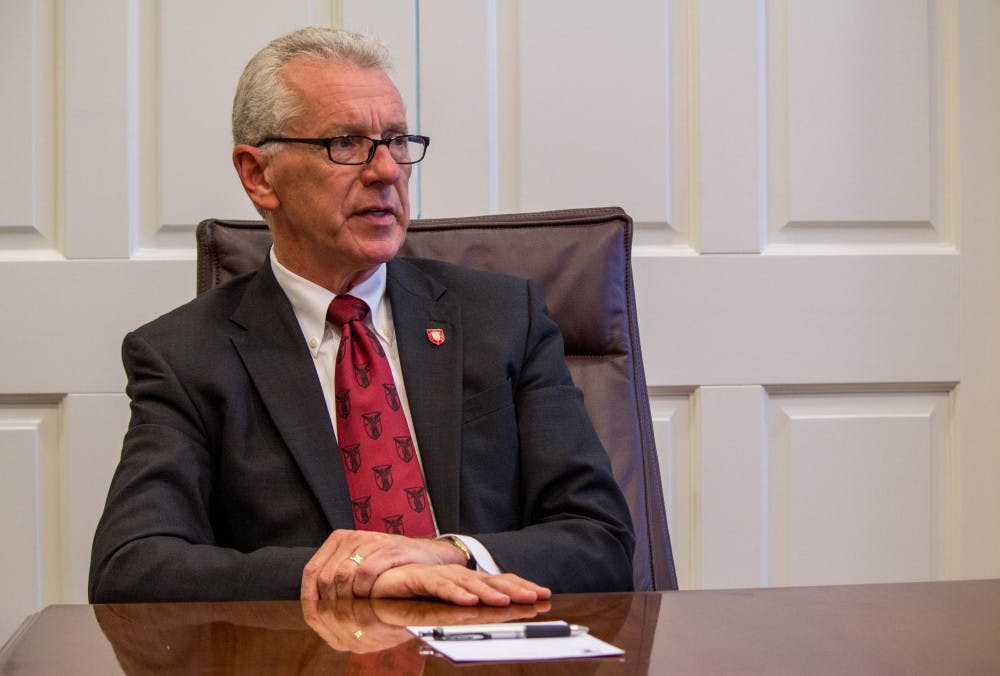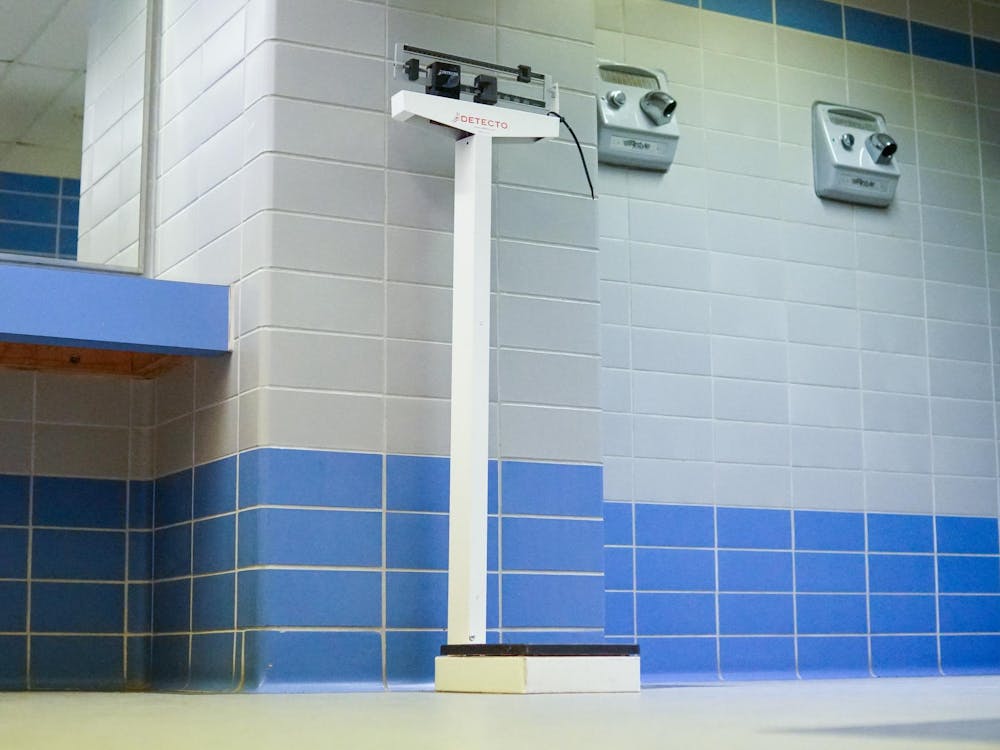Ball State Interim President Terry King never planned to lead Ball State, or any university for that matter.
He didn’t even really plan on becoming Ball State’s provost.
Before being hired as Ball State’s provost, King was working as the dean of engineering at Kansas State, with a PhD in chemical engineering. When a search firm started calling him about a provost job available at Ball State, his first reaction was to ignore it.
“I looked at the material and noted that Ball State has no engineering, so why in the heck would they want me?” King asked. “But they kept calling me, so I finally said, ‘I’ll give them my materials, and then they’ll reject me, because they don’t want engineers there.’”
It turns out the university was more than happy to add someone with an engineering background. King would spend the next eight or so years working closely with then-President Jo Ann Gora as Ball State’s provost and vice president for academic affairs.
Though few students probably know who he is, King is largely responsible for the university’s academic vision over the past 10 years as provost.
He has also kept the university moving forward through two periods of presidential searches, which included helping transition former President Paul W. Ferguson into power.
This time, he’s been in power for almost a year while the university searches for Ferguson's replacement, a time that has been clouded by controversy and questions about the university’s transparency.
But that hasn’t dimmed his focus.
A different Ball State
Before Gora and King’s tenure, Ball State was a much different place.
In 2006, construction on the David Letterman Communication and Media Building was just beginning, DeHority Complex and Studebaker Hall East had yet to be renovated and Park Hall’s completion was still a year away.
During Gora’s presidency, the college had raised admission standards, introduced the concept of immersive learning and completed more than $520 million worth of facilities construction and renovation, according to the university’s website.
While Gora received praise for Ball State’s growth, King played a large role in the evolution of the university, said Marilyn Buck, associate provost and dean of University College.
“The two of them together as a team, along with the rest of the cabinet, took the university in probably some of its fastest trajectory in terms of notoriety and respect,” Buck said. “The institution has been transformed during his time here, and some of that's part of [King’s] involvement and his leadership role working with the president and the cabinet.
“It’s not the same university that it was 15 years ago.”
One of King’s first tasks as provost was to create the university’s strategic plan. The university had worked on plans like this before, but never one with measurable benchmarks. This strategic plan set goals for areas such as the four-year graduation rate and first-year retention rate for the following five years.
For Buck, one of the most impressive aspects of the plan was that King was able to complete it so soon after coming to Ball State. That demonstrated the thorough thinking and intelligence she would see time and time again from King.
That sentiment was echoed by his long-term secretary Angie Vahner.
“The man never forgets anything,” she said. “I often used to wonder how he could keep everything straight with everything going on. He’s pulled in so many different directions, and he is always on it.”
King later led the university in a second strategic plan, which in 2015 evolved into President Ferguson’s Centennial Commitment, or 18 by '18 plan.
King also worked on the university’s first long-range academic plan, which led to the creation of the College of Health, opening next fall. The college combines all majors relating to health care, and many will eventually be housed in a new building.
“We’ll see the quality really go up by colocating those academic programs,” King said. “So that’s been the thing that has been really exciting about being at Ball State — having the opportunity to actually make substantive changes as we move forward.”
Buck said these long-range, 30-year plans aren’t very common at universities. While many colleges create new schools, they don’t always have the kind of research and planning behind them as Ball State’s College of Health.
Though King is only temporarily leading the university, he’s attempted to keep that same momentum these past 11 months.
As provost, King said he already had a relationship with the trustees and legislators, and is generally considered No. 2. As interim president, however, he’s had to focus more on fundraising, both from alumni and from the state legislature. This spring is a budget year for the Indiana General Assembly, when they’ll decide how much money each university gets, which makes King’s role even more important now.
He said the university is also focused on branding and marketing as well. The university just filled the position for vice president for marketing and communications.
“We want to make sure ... that everybody understands that this university is not slowing down, we’re moving ahead very quickly,” King said. “We’re fulfilling our strategic plan; everything is moving ahead as we hoped it would.”
In terms of future goals, however, Ferguson’s 18 by '18 plan was never intended to extend further than 2018, now just a year away. The university is lacking a comprehensive strategic plan for the near future, something the next president will likely contribute largely to.
Never a stepping stone
On the wall in one of the provost office conference rooms in the Administration Building is a picture of King at a graduation ceremony when he was provost. As Buck points out, there’s a faint smile on King’s face.
“If you really truly look at it, there’s satisfaction within the role that he has at that point,” she said. “Pictures can say a lot.”
As provost, King largely controlled the academic side of the university — the side which he has always felt most passionately.
“The interesting thing about academic administration is the core business of higher education is the interface between a faculty member and a student. … The knowledge of a faculty member is being transferred to the knowledge of a student, and that’s a really interesting process,” King said.
Throughout his career, most of his endeavors were focused on how to best educate students.
After getting his doctorate from the Massachusetts Institute of Technology in 1979, King spent three years as an engineer and then returned to teach at Iowa State, his undergraduate alma mater. He taught for 15 years, and was the department chair for seven of those years. After that he moved on to work at Kansas State for nine years.
“Maybe this is a piece that the students would not be aware of, but … he would still love to be teaching,” Buck said. “He loved his teaching. He loved advising students. That was one of his favorites in many ways. … But probably that’s one of the biggest things he talks about that he misses.”
King never took the role as provost to use as a stepping stone.
Ever since Ferguson resigned, King said he had no interest in applying for the position of president. He believes a president should be ready to commit for around 10 years — and King plans to retire in the near future.
“I truly enjoy the opportunity to be interim here at Ball State. In fact, it’s an honor,” King said. “It’s an institution which has so many positive things happening, but I’m just at the point in my career where I’m looking to do other things."
For King, that includes climbing mountains and spending more time with his wife and two grown kids.
He’ll wait to retire until he can transition the new president and until Ball State is in a “good, stable place.” The university is in the final leg of its presidential search and is expected to announce the president sometime between now and February.
Regardless of how soon he’ll leave the university, Buck said his impact will be “long-lasting.”
“This institution — and most importantly our students — should be pleased that Terry King has been here,” Buck said. “Whether they know it or not, his impact on the university will be long-lasting. He’s humble enough to not take credit for what's gone on, but the university is much better off, and so are the students.”





